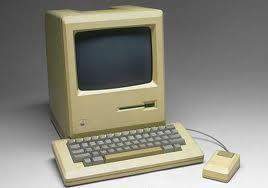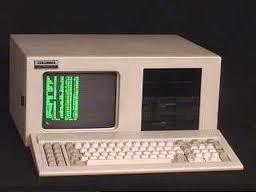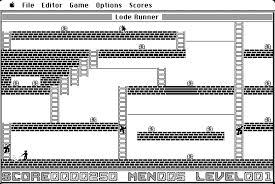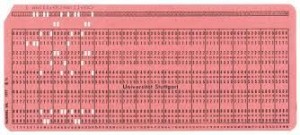My children like to make comparisons between the technology I had growing up and what they have today. In the course of a recent conversation on this topic, it occurred to me that, having been born in 1966, I have lived through the entire evolution of the personal computer and the internet.
The internet got its start in the 1960s with government funding through an organization called the Advanced Research Project Agency (ARPA), whose original network was called ARPANet. In time, the project was taken over by the Department of Defense, which changed the name to DARPANet. Advances in DARPANet continued until, in 1983, it was split into military and civilian networks. At first the civilian network was restricted to non-commercial uses such as research. These restrictions were eased over time, allowing the internet to weave its way into nearly every aspect of our lives.
In the fall of 1983, I started my senior year at State College Area High School, which is effectively the Chapel Hill High School of Pennsylvania. This was the first year that the school had a computer lab. We used Apple computers, which look substantially like the one shown here.  We learned word processing and computer programming in both BASIC and Pascal. It’s hard to convey to my children how fascinating this was for me, since I had never used a personal computer before.
We learned word processing and computer programming in both BASIC and Pascal. It’s hard to convey to my children how fascinating this was for me, since I had never used a personal computer before.
In August of 1984, I headed to the University of Virginia. I was the only student I knew of who had their own PC. It was the size of a suitcase, weighed a ton, and had a 4” x 6” screen. It looked almost exactly like the one in this picture.  I also had a dot matrix printer so I could type up my homework on the word processor, print it out, and turn it in. This is commonplace now, but in 1984 for a student with atrocious handwriting such as mine, it was a godsend. I had only one computer game, called Lode Runner. My roommates and I played for hours. Here is a screenshot from the 1984 version.
I also had a dot matrix printer so I could type up my homework on the word processor, print it out, and turn it in. This is commonplace now, but in 1984 for a student with atrocious handwriting such as mine, it was a godsend. I had only one computer game, called Lode Runner. My roommates and I played for hours. Here is a screenshot from the 1984 version. 
By 1984, most large universities had email capability. Therefore, I could send emails back and forth to my father, who worked at Penn State, using a 300 baud rate modem which looked like this.  Today’s internet connection speeds can be millions of times faster. To use this old modem you would dial the phone, wait for the computer to pick up, and then, when you heard a loud, static-like noise, stick the hand set into the two plastic suction cups. The modem also provided access to the main frame computer on campus, allowing me to write computer programs to solve math and engineering problems, which saved me hours of time compared to doing them by hand. Prior to being able to communicate with the mainframe via a simple modem like this, computer programming was done with paper punch cards. Seriously. They looked like this.
Today’s internet connection speeds can be millions of times faster. To use this old modem you would dial the phone, wait for the computer to pick up, and then, when you heard a loud, static-like noise, stick the hand set into the two plastic suction cups. The modem also provided access to the main frame computer on campus, allowing me to write computer programs to solve math and engineering problems, which saved me hours of time compared to doing them by hand. Prior to being able to communicate with the mainframe via a simple modem like this, computer programming was done with paper punch cards. Seriously. They looked like this.  A complicated computer program required whole boxes of them, which had to be fed into the computer’s card reader in the proper order. During the summer of 1982, I worked cleaning out labs at Penn State University and had to sort through and store many of these old punch card programs.
A complicated computer program required whole boxes of them, which had to be fed into the computer’s card reader in the proper order. During the summer of 1982, I worked cleaning out labs at Penn State University and had to sort through and store many of these old punch card programs.
Looking back, I feel lucky to have been around for the beginning of the PC and internet revolutions. I think you appreciate the value of personal computers and the internet in a more meaningful way if you have memories of hand writing overhead transparencies and doing research in the Encyclopedia Britannica. Looking ahead, I wonder what my grandchildren will think about the technology my children have today. Time will tell.
If you have a comment, question, or personal story about your introduction to computers and the internet, use the interface below or send me an email at commonscience@chapelboro.com.
Related Stories
‹
![]()
Major Outage at Amazon Disrupts Businesses Across the USWritten by FRANK BAJAK and BARBARA ORTUTAY A major outage in Amazon’s cloud computing network Tuesday severely disrupted services at a wide range of U.S. companies for more than five hours, the latest sign of just how concentrated the business of keeping the internet running has become. The incident at Amazon Web Services mostly affected […]
![]()
Global Glitch: Swaths of Internet Go Down After Cloud OutageWritten by KELVIN CHAN Multiple websites went offline briefly across the globe Tuesday after an outage at the cloud service company Fastly, revealing how critical a handful of companies running the internet’s plumbing have become. Dozens of sites including the New York Times, CNN, some Amazon sites, Twitch, Reddit, the Guardian, and the U.K. government’s home […]
![]()
Orange County Computers Hit with VirusOrange County provided residents with an update Tuesday afternoon.**** Orange County computers were shut down for most of Monday after being hit by an encryption virus. County officials detected the virus on the countywide network, leading them to shut down all internal servers, according to a release Monday evening. “The county IT department is […]
![]()
Net Neutrality Repealed, Fake Comments Allegedly Submitted: What's Next?The Federal Communications Commission voted last Thursday to repeal 2015 net neutrality rules, which required internet service providers, or ISP’s, to offer equal access to web content without being able to block certain websites, slow data transmission or give priority quality to higher paying customers. The decision was made despite a letter sent to the […]
![]()
Twenty Chapel Hill Public Housing Residents Take Home Free Desktop ComputersTwenty residents were met with applause at the Chapel Hill Public Library on Tuesday, presented with a certificate and congratulated by Chapel Hill Mayor Pam Hemminger and Council Member Michael Parker. Each student received a free desk top computer, a keyboard, mouse and router upon completing a computer skills training program for residents who live […]
![]()
Chapel Hill Rejects Internet Filters for Public LibraryThe Chapel Hill Town Council rejected a motion on Monday night to purchase software that would censor pornographic internet content on computers at the Chapel Hill Public Library. The rejection was unanimous by council members, who heard from Brian Sturm, the chair of the Chapel Hill Public Library Board of Trustees, on why the software […]
![]()
Chapel Hill Considers Internet Filters for LibraryLibrary officials in Chapel Hill are looking to upgrade, or change the internet policy for library computers, to block access to visual depictions of child pornography. Library computer users currently have unfiltered access to the internet, and mayor Pam Hemminger said that can pose problems for children and families who also use the library’s resources. […]
![]()
Ephesus Church Road Access Limited by Google Fiber ConstructionThe pursuit of faster internet connection speeds in Chapel Hill will produce a month of traffic delays for motorists who depend on access to Ephesus Church Road. Traffic along that road will be consolidated onto one lane from Tinkerbell Road to Colony Woods Drive during the hours of 9:00 AM and 4:00 PM while contractors […]
![]()
Chatham County Asking Residents and Businesses About Barriers to Internet AccessAs internet access becomes less of a luxury and more of a necessity, Chatham County officials are asking residents about barriers to internet access in portions of the county. While officials acknowledge in a release that “the county is restricted in what it can do to promote more options,” they are asking residents and organizations […]
![]()
Chansky’s Notebook: World Wide Waste?Wasn’t the internet supposed to simplify things? When the World Wide Web emerged more than 20 years ago, those who understood its potential claimed it would make life easier. Less mail and phone calls because everything could be paid and answered on line. Is that what happened? Quite the opposite. Yes, the internet is a […]
›
 We learned word processing and computer programming in both BASIC and Pascal. It’s hard to convey to my children how fascinating this was for me, since I had never used a personal computer before.
We learned word processing and computer programming in both BASIC and Pascal. It’s hard to convey to my children how fascinating this was for me, since I had never used a personal computer before. I also had a dot matrix printer so I could type up my homework on the word processor, print it out, and turn it in. This is commonplace now, but in 1984 for a student with atrocious handwriting such as mine, it was a godsend. I had only one computer game, called Lode Runner. My roommates and I played for hours. Here is a screenshot from the 1984 version.
I also had a dot matrix printer so I could type up my homework on the word processor, print it out, and turn it in. This is commonplace now, but in 1984 for a student with atrocious handwriting such as mine, it was a godsend. I had only one computer game, called Lode Runner. My roommates and I played for hours. Here is a screenshot from the 1984 version. 
 Today’s internet connection speeds can be millions of times faster. To use this old modem you would dial the phone, wait for the computer to pick up, and then, when you heard a loud, static-like noise, stick the hand set into the two plastic suction cups. The modem also provided access to the main frame computer on campus, allowing me to write computer programs to solve math and engineering problems, which saved me hours of time compared to doing them by hand. Prior to being able to communicate with the mainframe via a simple modem like this, computer programming was done with paper punch cards. Seriously. They looked like this.
Today’s internet connection speeds can be millions of times faster. To use this old modem you would dial the phone, wait for the computer to pick up, and then, when you heard a loud, static-like noise, stick the hand set into the two plastic suction cups. The modem also provided access to the main frame computer on campus, allowing me to write computer programs to solve math and engineering problems, which saved me hours of time compared to doing them by hand. Prior to being able to communicate with the mainframe via a simple modem like this, computer programming was done with paper punch cards. Seriously. They looked like this.  A complicated computer program required whole boxes of them, which had to be fed into the computer’s card reader in the proper order. During the summer of 1982, I worked cleaning out labs at Penn State University and had to sort through and store many of these old punch card programs.
A complicated computer program required whole boxes of them, which had to be fed into the computer’s card reader in the proper order. During the summer of 1982, I worked cleaning out labs at Penn State University and had to sort through and store many of these old punch card programs.
